Heavy snow in Germany, Austria, Greece causes chaos for travellers
Heavy snowfalls across Europe — even in Greece — have thrown travel plans into chaos, trapping hundreds in alpine regions and airports, and leaving snow on Italian beaches.

Heavy snow caused travel chaos in parts of Germany and Austria as authorities closed roads and train routes because of avalanche danger and airports reported weather-related cancellations on Saturday.
Munich Airport, Germany’s second biggest, said 120 flights were cancelled and others were delayed while workers cleared runways of snow and removed ice from planes.

Austrian railway company OeBB said several train connections were suspended due to the avalanche risk. Authorities closed several roads including around Bischofshofen, which is hosting the annual Four Hills ski jump tournament this weekend, following more than 50 centimetres of fresh snow overnight. Salzburg regional authorities warned against off-trail skiing, adding that “many large, several very large avalanches are likely in the afternoon and overnight” that could affect roads and rail lines.

Austrian public broadcaster ORF reported that the small village of St. Johann was evacuated because authorities feared strong winds could trigger a large avalanche. Meanwhile, some 600 residents and tourists were stuck in the village of Soelktal following a road closure, the station reported.
Innsbruck airport said “current weather conditions have caused major restrictions in air traffic” and urged travellers to check their flight status before heading to the airport.
Significant snowfall is forecast for southern Germany, Austria and Switzerland in coming days.

Separately, authorities in Greece reported travel disruptions due to snowfall in the north of the country. As the record-breaking snowfalls engulfed much of central Europe, bringing the Continent the coldest Christmas in 120 years, a rare sight was seen: snow on Greek and Italian beaches.
The heavy snow is the result of cold Arctic air sweeping across Europe in the first week of January, bringing wild and cold weather to normally milder regions such as Turkey and Southern Italy.



